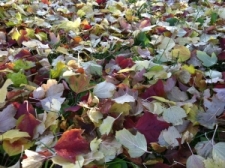 As Professor Mazzie noted below, April is National Poetry Month. (How have you been celebrating?) I thought I would take the occasion to post one of my favorites, from a poet who is not that well known any more: Gerard Manley Hopkins. Hopkins wrote poems in a peculiar style; among other things, the stress marks in the lines below are intended to indicate emphasis — I think the poem works better if you follow them.
As Professor Mazzie noted below, April is National Poetry Month. (How have you been celebrating?) I thought I would take the occasion to post one of my favorites, from a poet who is not that well known any more: Gerard Manley Hopkins. Hopkins wrote poems in a peculiar style; among other things, the stress marks in the lines below are intended to indicate emphasis — I think the poem works better if you follow them.
Spring and Fall
to a young child
Márgarét, áre you gríeving
Over Goldengrove unleaving?
Leáves, líke the things of man, you
With your fresh thoughts care for, can you?
Áh! ás the heart grows older
It will come to such sights colder
By and by, nor spare a sigh
Though worlds of wanwood leafmeal lie;
And yet you wíll weep and know why.
Now no matter, child, the name:
Sórrow’s spríngs áre the same.
Nor mouth had, no nor mind, expressed
What heart heard of, ghost guessed:
It ís the blight man was born for,
It is Margaret you mourn for.

The Essex-born Hopkins was also a convert to Roman Catholicism and a Jesuit priest, although by most accounts, not a very happy one.
His “peculiar style”, to which Prof. Boyden refers above, was derived from Anglo-Saxon poetry and was known, in Hopkins own terminology, as “sprung rhythm.”
I have a different favorite Hopkins poem dealing with spring. It is titled simply, “Spring.”
Nothing is so beautiful as Spring—
When weeds, in wheels, shoot long and lovely and lush;
Thrush’s eggs look little low heavens, and thrush
Through the echoing timber does so rinse and wring
The ear, it strikes like lightnings to hear him sing;
The glassy peartree leaves and blooms, they brush
The descending blue ; that blue is all in a rush
With richness; the racing lambs too have fair their fling.
What is all this juice and all this joy ?
A strain of the earth’s sweet being in the beginning
In Eden garden.—Have, get, before it cloy,
Before it cloud, Christ, lord, and sour with sinning,
Innocent mind and Mayday in girl and boy,
Most, O maid’s child, thy choice and worthy the winning.